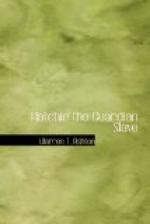“I have been in a better position, it is true. I was born in France, but I understand the business.”
“Did you ever manage a gang of niggers?”
After a little hesitation, Dalhousie replied that he had.
“We will talk of it some other time,” said Jaspar, satisfied, from the air and manner of the other, that his statement was false.
Dalhousie put on his hat, and, taking the mourning ring from the table, was about to enfold it in a bit of paper.
“What are you about, sir?” exclaimed Jaspar, as he witnessed the act.
“The ring is my property, is it not?” said Dalhousie.
“Put it down, or, by heavens, I will expose your rascality in taking it!”
“Do not be hasty, sir. I have not studied your looks, the last hour, without profiting by them.”
“What do you mean by that?” said Jaspar, a little startled.
“I mean that the death of your niece does not seem to be received with that degree of sorrow which an uncle would naturally feel.”
“Fool! she was not my niece!”
“Why are you so anxious to establish her decease?”
“Was I anxious?” said Jaspar, not knowing how far he might have betrayed himself.
“Quite enough so to convince even the most indifferent observer that you were extremely rejoiced at the event,” replied Dalhousie, willing to make out a strong case.
Jaspar did not reply, and it was plain Dalhousie’s remarks had had their effect.
“But, Mr. Dumont, I flatter myself I am a man of discretion. As you were saying, you need an overseer,” said Dalhousie, with a glance at Jaspar, which conveyed more meaning than his words.
The glance was irresistible, and Jaspar engaged him at a liberal salary, as well as his wife, who was to be the housekeeper at Bellevue. Dalhousie was a needy man. His fortunes were on the descending scale. Born in France, he had emigrated to this country, with the chimerical hope of speedily making a fortune. He could not build up the coveted temple stone by stone, but wished it to rise like a fairy castle. With such views, he had wandered about the country with his wife (whom he had married since his arrival), in search of the philosopher’s stone. He had several times engaged in subordinate capacities, but his impatient hopes would not brook the distance between him and the goal. He had been to New Orleans, but the city was almost deserted. On his arrival at Vicksburg, Jaspar had been pointed out to him as a person who could probably favor his wishes, and he had obtained an introduction to him.
Jaspar’s thoughts and feelings he read. He discovered the nature of the relations between the uncle and niece,—which required but little sagacity, under the circumstances. Determined to profit by the knowledge he had obtained, his first step was to satisfy Jaspar of the death of Emily, of whom, in reality, he knew nothing. The initial letter of his wife’s name in the ring had suggested the means, and he had convinced Jaspar as related. How Dalhousie’s sense of moral rectitude would allow him to use the deception, we will not say; but he seemed to tolerate the idea that the great purpose he had in view would justify any little peccadilloes he might commit in obtaining it.




